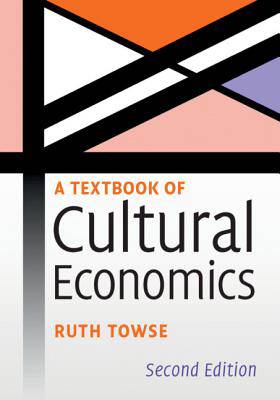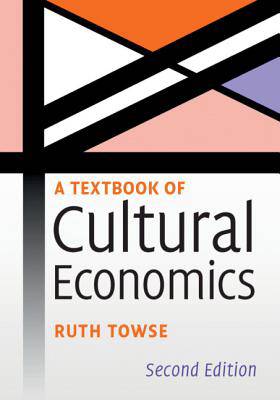
Door een staking bij bpost kan je online bestelling op dit moment iets langer onderweg zijn dan voorzien. Dringend iets nodig? Onze winkels ontvangen jou met open armen!
- Afhalen na 1 uur in een winkel met voorraad
- Gratis thuislevering in België vanaf € 30
- Ruim aanbod met 7 miljoen producten
Door een staking bij bpost kan je online bestelling op dit moment iets langer onderweg zijn dan voorzien. Dringend iets nodig? Onze winkels ontvangen jou met open armen!
- Afhalen na 1 uur in een winkel met voorraad
- Gratis thuislevering in België vanaf € 30
- Ruim aanbod met 7 miljoen producten
Zoeken
Omschrijving
Now in its second edition, A Textbook of Cultural Economics is an established resource for many courses, including economics of the arts, the cultural and media industries, and the digital creative economy. Authored by Ruth Towse, a widely recognised expert in cultural economics, the book offers a comprehensive, up-to-date overview and analysis of the field in the digital era. Written in an accessible style, and with suggestions for further reading, it covers a range of topics, from the more traditional arts to the creative industries (such as music, film, games, broadcasting, and publishing), as well as the economics of artists' labour, markets and copyright. This second edition considers the creative economy up to the present, emphasising the role of digitisation across the creative industries. It will appeal to students taking courses in the economics of art and culture, and can also be used in courses on arts management and cultural policy.
Specificaties
Betrokkenen
- Auteur(s):
- Uitgeverij:
Inhoud
- Aantal bladzijden:
- 722
- Taal:
- Engels
Eigenschappen
- Productcode (EAN):
- 9781108421683
- Verschijningsdatum:
- 3/10/2019
- Uitvoering:
- Hardcover
- Formaat:
- Genaaid
- Afmetingen:
- 180 mm x 250 mm
- Gewicht:
- 1542 g

Alleen bij Standaard Boekhandel
+ 484 punten op je klantenkaart van Standaard Boekhandel
Beoordelingen
We publiceren alleen reviews die voldoen aan de voorwaarden voor reviews. Bekijk onze voorwaarden voor reviews.











